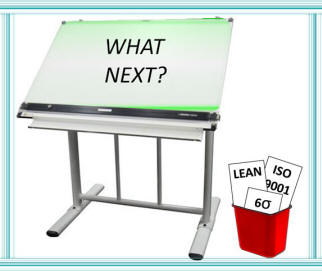Alternatives to Lean Six Sigma Failures
- Home >
- articles >
- maintenance-management >
- lean six sigma failures
Industrial process systems to lean business systems success via IMW

How to Get Your Company to World Class OEE Easier and Faster Than Ever Before!
Article by Mike Sondalini:
What next, now that Lean, Six Sigma and ISO 9001 have proved to be terribly unreliable at business improvement? Your organization is a system. It also belongs to many other systems. The department you work in is a system. It is integral to the whole system that is your organization. You are a system that is part of your departmental system. Each task you do is a system that combines with your other functions to form the system you know as your job. That’s how the universe works—overlapping, interconnected systems. But no one manages companies, or runs departments, or does their job as the “entwined systems” that they all really are. To manage the system-wide effects and behaviors of an industrial operation you need an Industrial and Manufacturing Wellness mindset, along with its new system engineering and system reliability methods.
There’s a mountain of online comments discussing why Lean, Six Sigma and ISO 9001 quality management so often fail to make industrial operations successful. The following admonition is from a process improvement consultant...
“I've just read your article "Why Lean Production fails to make USA, European and Australian Industry competitive and what to do about it." and I want to thank you for it. It is the first time that I’ve see this standpoint about Lean being expressed in writing. I am now collecting ideas about why Lean fails in so many organizations, and your article has just given me the one big missing element of the puzzle.”
The crux of the article was that Toyota IS the “Toyota Production System". TPS works only for Toyota and it cannot work for another organization because they are not Toyota clones. Other car companies in the world who want to beat Toyota must not use TPS. They must design and create their own world class business system that controls and coordinates all the other systems interacting with the organization. No one can beat Toyota at doing the Toyota Production System. If a car company wants to leap frog Toyota to become the best of the best, they need a surer way than copying some TPS concepts and adding them as “point solutions” into their own processes.
Company management can think that an ISO 9001 quality management system, Lean or Six Sigma are solutions to insert into their operating processes and “hey presto,” as if by magic, their company becomes a world class performer. Managers don’t consider that an operating site, its processes, and each person at the site, are systems working within systems. Change one part of a system and you get both bad and good knock-on effects sent into every interconnected system. Business improvement failures, and the lost fortunes they represent, are to be expected if you manage an industrial site as just a set of stand-alone processes, run by stand-alone managers, and manned by stand-alone people.
“The system is everything”
...is the right business improvement mantra to have. You want system improvements, not process improvements. Managers and consultants that look only at improving a process easily harm system performance. For example, if you reduce maintenance spare parts levels to recover money tied up in warehoused stock, you can easily cause increased production downtime because the parts you need for repairs are not in stock when you need them. If you make the wrong reductions to your parts holdings you increase your production losses and costs. The Warehousing and Stores system must be subservient to the Production system. Only Production makes money for the company, and least cost, safe production is the prime operating imperative. Making it a priority to recover money by cutting maintenance parts stock levels is usually “system-crazy” decision-making. Sure, you don’t want excess stock, but it’s not worth cutting spare parts levels if it raises the risk of destroying your profits by more than what the parts cost you to have.
A common procurement policy that is a system-crazy choice, because it causes sub-optimal production results, is to use the cheapest items and outsourced services you can get. When you buy cheapest you also guarantee that your unit cost of production will rise. Your operation needs raw materials and equipment parts of a particular engineering quality in order to get the required production plant availability, utilization and throughput. You also need a minimum competence level for all the outsourced services you hire. Go below those minimum materials and service quality levels and your equipment cannot reach the uptime, nor can the plant deliver the throughput, that you want. Production suffers badly and you continually miss your monthly operating profit targets—but, “wow,” your warehouse inventory ratios do look great. The right policy is to maximize business success. To do that get the highest quality item or service that returns the most “system success” that you can afford to buy.
When companies decide to use Lean and Six Sigma they make the typical mistake of starting with workforce training in Lean and Six Sigma methods. They are told that Lean is the “empowerment of the workforce". They hear the half-story that at Toyota every operator can stop the production line to correct a problem. So they start their productivity improvement initiative by teaching their people some Lean techniques used by the operators and office workers at Toyota.
There is absolutely no way in the world that Toyota would let an operator stop a production line, unless Toyota was totally sure that the right choice to make is to stop production. The prime requirement for operators at Toyota must be that they are expert at doing their part of the production. TPS must be used by Toyota to create subject matter experts with the correct information to run their processes most perfectly.
To get outstanding operational performance you need to have perfected your system and its processes so that they will produce ideal results. Nothing else matters if you have the wrong processes for what you want to get. To gain operational success that lasts forever you need to put the most effective practices into your processes and then do them most efficiently. But you can’t stop there. You must also continuously change to use better innovations and solutions as they arise. Stop doing process improvements, instead adopt the correct paradigm of endlessly creating optimal system success. That’s the real “Toyota way".
Since Lean, Six Sigma and ISO 9001 are unreliable methodologies for building high performance companies, the next methodology used to reach world class performance must be unfailingly successful for all its users. It already exists. It is a true systems engineering solution called Industrial and Manufacturing Wellness. It gets industrial operations to design and build ideal business systems with optimal processes. It lets you replicate success across every operation.
When humans have “wellness", they are in a state where body, mind, and spirit are holistically integrated, and, as a result, are healthy, happy, proactive, and resilient. The same can be said for a business that has wellness. Industrial and Manufacturing Wellness (IMW) uses reliability science and system engineering principles to design and build companies that are robust, reliable, self-improving, integrated business systems best suited for achieving optimal results.
Industrial and Manufacturing Wellness makes sure that every improvement will surely enhance system performance. It protects you against making system-wide mistakes and having disastrous organizational change. In an IMW improvement project no training is done until the process design can deliver optimal system performance. It means that when the training is conducted, your people learn to properly do that which makes their processes work brilliantly. Like Toyota, at an Industrial and Manufacturing Wellness site your people become subject matter experts in what they do. By using Industrial and Manufacturing Wellness solutions your organization and its people can give you a world class business.
IMW makes you engineer a high performance organization that works excellently from the start. There is no such thing as process reengineering, where you fix lousy processes that don’t work right. When you design and build your company the Industrial and Manufacturing Wellness Way you get a holistic business system sure to get the operating results it’s designed to deliver.
Industrial and Manufacturing Wellness changes industrial operations from “also ran” businesses to world class leaders in their field. Starting where your company is today you begin by creating the optimal business system design. You create the ideal processes to deliver all the production aims you want. You include the right skills and practices so every process maximizes system success. You train your people to do the designed processes in the right way. Companies built the Industrial and Manufacturing Wellness Way are destined to get utmost production success.
Continue by downloading Mike and Don's eBook True Downtime Cost (TDC) - 2nd Edition
Copyright 2016 - BIN95.com (You may link to this article only)
